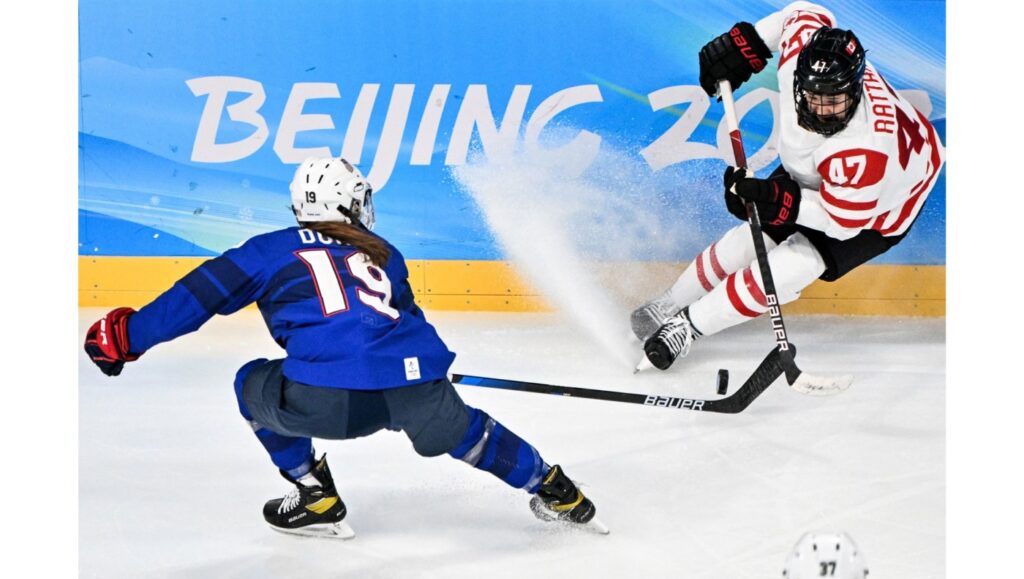
By JOHN WAWROW AP Hockey Writer
BEIJING — American assistant captain Hilary Knight calls it “a beautiful rivalry.” Canadian captain Marie-Philip Poulin sums it up as “very fun.”
Don’t be fooled by the pleasantries.
One of the fiercest and longest-running grudge matches in international sports will play out for the second time at the Beijing Olympics, with the meeting Thursday (Wednesday, 8:10 p.m. PT, NBC) between the United States and Canada determining who goes home with gold.
“These are the games that we live for,” U.S. captain Kendall Coyne Schofield said following a 4-1 semifinal win against Finland. “Everyone’s been so resilient through the pandemic with the ups and downs, the cancellations, postponements and finding ways to train, and it’s for this moment. We’re going to empty the tanks, and this is what we came here to do.”
The U.S. is the defending Olympic champion after rallying to beat Canada, 3-2, in a shootout at the 2018 Pyeongchang Games.
The Canadians are considered the favorites this time after steamrolling to a 6-0 record and outscoring their opponents 54-8, including a 4-2 win over the U.S. in group play.
Canada also had the edge over its cross-border rivals since Poulin scored the gold medal-winning goal in a 3-2 overtime victory over the U.S. at the world championships in August to end the Americans’ streak of five tournament titles. Canada is 5-1-1 in seven meetings against the U.S. since.
Overall at the Olympics, which added women’s hockey in 1998, Canada is 6-3 against the U.S., with four gold medals to the Americans’ two.
Success aside, the lingering memory of 2018 stings.
“In all honesty, it was very anti-climactic for us to lose in a shootout, because it didn’t feel as if you lost a game,” said Canada forward Sarah Nurse, who leads the tournament with 16 points (four goals, 12 assists). “It almost felt like unfinished business. So going into this gold-medal game, regardless of who we play, we’re here to finish business and win a hockey game.”
Nurse spoke following a 10-3 semifinal victory over Switzerland, and before knowing who Canada would face.
It’s only fitting that it’s the U.S., with the two countries meeting for the sixth time in seven Olympic finals. The exception was 2006, when Canada won the final against Sweden, which beat the U.S. in the semifinals.
The game Thursday will mark the fourth time that the U.S. and Canada will have met twice in the same Olympic tournament. In the first two instances, the Americans (1998 Nagano) and Canadians (2014 Sochi) won both times. In 2018, the U.S. won the title after a 2-1 loss to Canada in group play.
The challenge for the Americans is containing Canada’s relentlessly dynamic, quick-strike transition attack, which scored five times in a first-period span of 3:24 against Switzerland to set an Olympic record for the fastest five goals. Against the Americans, Canada overcame a 2-1 deficit by scoring three times in a span of 5:25.
Switzerland coach Colin Muller said the Canadians’ rolling four-line attack is dizzying because they make it hard for opponents to change lines.
“They’re just so tenacious,” Muller said, blowing into his mask in awe. “Like if you told me who’s their best player, I don’t even know, really. I look at their lineup before the game and I’m going, ‘Well, what do you want to do?’”
U.S. coach Joel Johnson believes his team can compete, in part because it has yet to play its best game.
“When we played them the last time, I thought we were pretty good, but we didn’t generate enough great opportunities to score,” Johnson said.
Finishing chances has been an issue for the U.S., which ranks fifth out of 10 teams in scoring efficiency with 28 goals on a tournament-leading 334 shots. The Americans are also missing top-line center Brianna Decker, who broke her left leg in the tournament opener.
“I just feel really good about how we match up against Canada,” Johnson said. “I think if we can generate a few more scoring chances and make some plays, then that would hopefully be our best game.”
The Americans won’t go into detail, but they have a few grudges to settle. It’s evident when U.S. players reference the two nations’ nine-game pre-Olympic Rivalry Series being abruptly canceled with three games left because of Canada’s COVID-19 concerns.
What bugs the Americans is that they were preparing to play on home ice in Minnesota, with some 11,000 tickets sold, when the Canadians backed out at the last moment after Emily Clark tested positive.
Related Articles
Slovakia stuns Team USA in Olympic hockey quarterfinals
Americans Alex Hall, Nick Goepper finish 1-2 in Olympic freeski slopestyle
Kamila Valieva leads Olympic skating competition overshadowed by doping scandal
Mikaela Shiffrin upbeat after 18th-place finish in Olympic downhill
Eileen Gu earns silver medal in women’s ski slopestyle, her 2nd medal in Beijing
And members of the U.S. team shook their heads at the drama Canada created upon refusing to take the ice for its preliminary round game against the Russians because their opponent’s COVID-19 tests results were not available. The start of the game was delayed by an hour and in jeopardy of being postponed, before the International Ice Hockey Federation reached a compromise to have the teams wear masks.
This is not how the Americans handled things, having no issue playing – and beating the Russians, 5-0 – a day after an ROC player tested positive.
Every slight in this rivalry is taken personally, with each side paying close attention to what the other is doing.
“What do you want me to say?” Knight asked when the prospect of facing Canada once again was mentioned. “It gets the best and the worst out of both of us at the same time.”
